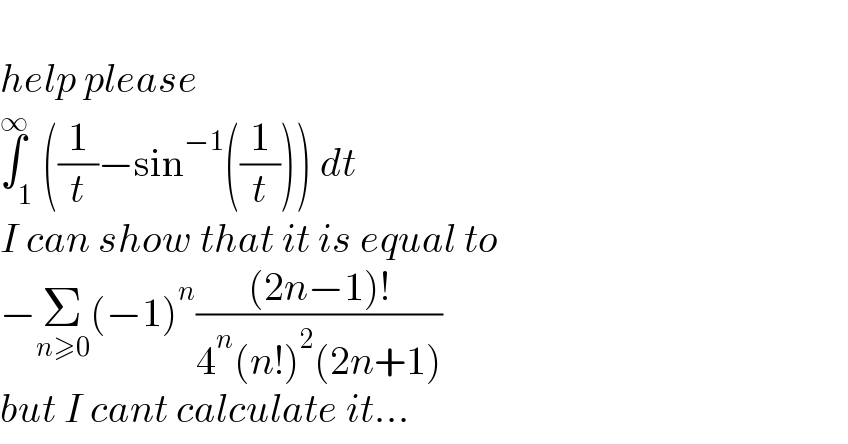
Question and Answers Forum
Question Number 170349 by antoineop last updated on 21/May/22

Answered by aleks041103 last updated on 21/May/22
![(1/( (√(1−x^2 ))))=(1+(−x^2 ))^(−1/2) (1+z)^a =1+az+((a(a−1))/2)z^2 +((a(a−1)(a−2))/(3!))z^3 +...= =1+Σ_(i=1) ^∞ (z^i /(i!))Π_(j=0) ^(i−1) (a−j) (1/( (√(1−x^2 ))))=1+Σ_(i=1) ^∞ (((−x^2 )^i )/(i!))Π_(j=0) ^(i−1) (−(1/2)−j)= =1+Σ_(i=1) ^∞ (((−1)^i x^(2i) )/(i!)) Π_(j=0) ^(i−1) (−(1/2))(2j+1)= Π_(j=0) ^(i−1) (−(1/2))(2j+1)=(−(1/2))^i (1.3. ... .(2i−1)) 1.3. ... .(2i−1)=(((2i)!)/(2^i i!)) (1/( (√(1−x^2 ))))=1+Σ_(i=1) ^∞ (((2i)!)/(4^i (i!)^2 ))x^(2i) =Σ_(i=0) ^∞ (((2i)!)/(4^i (i!)^2 ))x^(2i) sin^(−1) (x)=∫_0 ^( x) (dx/( (√(1−x^2 ))))= =Σ_(i=0) ^∞ (((2i)!)/(4^i (i!)^2 ))∫_0 ^( x) x^(2i) dx=Σ_(i=0) ^∞ (((2i)!)/(4^i (2i+1)(i!)^2 ))x^(2i+1) (1/t)−sin^(−1) (t)= =(1/t)−Σ_(i=0) ^∞ (((2i)!)/(4^i (2i+1)(i!)^2 )) (1/t^(2i+1) )= =−Σ_(i=1) ^∞ (((2i)!)/(4^i (2i+1)(i!)^2 )) (1/t^(2i+1) ) ⇒∫_1 ^∞ ((1/t)−asin((1/t)))dt= =−Σ_(i=1) ^∞ (((2i)!)/(4^i (2i+1)(i!)^2 )) ∫_1 ^∞ t^(−2i−1) dt= =−Σ_(i=1) ^∞ (((2i)!)/(4^i (2i+1)(i!)^2 )) ((t^(−2i) /(−2i))]_1 ^∞ = =−Σ_(i=1) ^∞ (((2i−1)!)/(4^i (2i+1)(i!)^2 ))](Q170357.png)
Commented by aleks041103 last updated on 21/May/22

Commented by antoineop last updated on 21/May/22
Yep thats what I did, thanks ! (I'm sorry my English is really bad) but I'm supposed to calculate this integral, so, I'm supposed to calculate this sum and I don't know how..
Commented by aleks041103 last updated on 21/May/22

Commented by antoineop last updated on 21/May/22
My exercise just tell me "Justify the existence of this integral and then, calculate it" I dont know how to calculate this sum, I've also tried IBP but .. still impossible
Commented by aleks041103 last updated on 21/May/22

Commented by antoineop last updated on 21/May/22
That's what I think too, I'll ask my teacher next week and share it if he has a way (of not) to calculate that ! thanks :)
Commented by aleks041103 last updated on 21/May/22

Commented by aleks041103 last updated on 21/May/22
![f(x)=sin^(−1) (x)−x we analyze x∈[0,1] we know that x≥sin(x), x≥0 ⇒sin^(−1) x≥x≥0 ⇒sin^(−1) x−x≥0 ⇒∫_1 ^∞ −f((1/t))dt≤0](Q170367.png)
Commented by antoineop last updated on 22/May/22
yeah but in France in 99% of analysis exercises we are able to calculate directly the sum
Commented by Tawa11 last updated on 08/Oct/22

